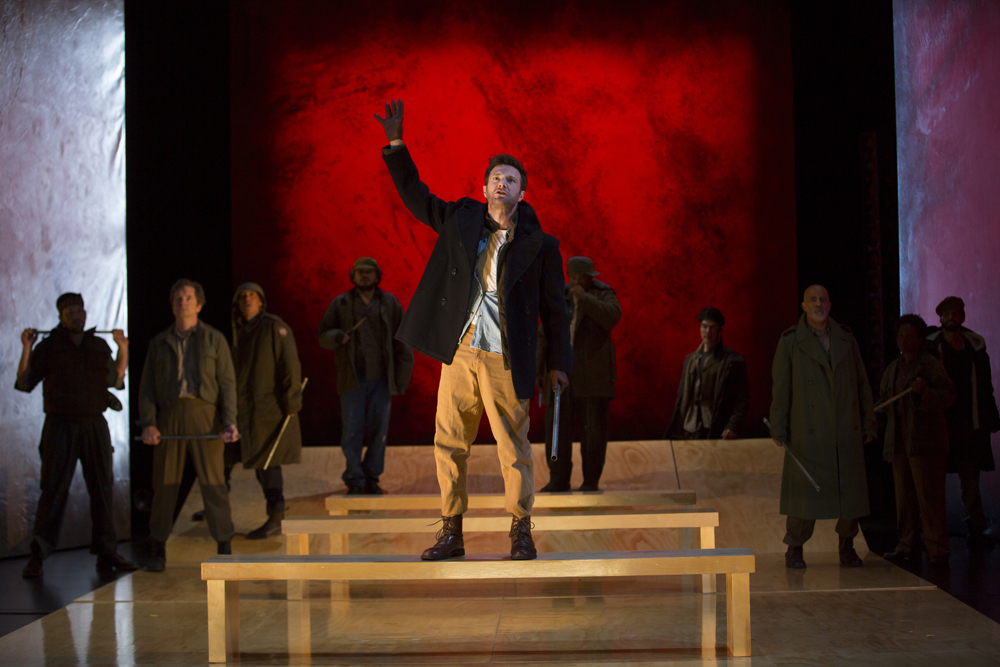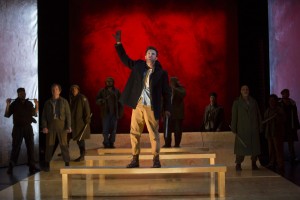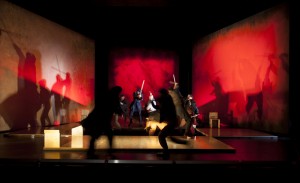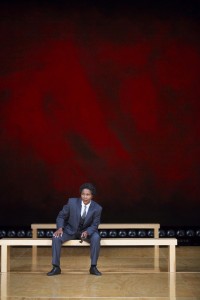The lights are on at Two River, and the curtain is again up on Michael Sexton’s gritty and high-concept HENRY V, a bold piece of theater that deserves far better than the shortened run Hurricane Sandy has imposed on it.
It is of course tempting to call the gutsy cast a “band of brothers,” galvanized enough to ensure the show goes on through adversity, or the small matinee audience who ventured to the theater Saturday afternoon through the storm-wracked streets of the Jersey shore a “happy few” finding respite in the arts from Sandy’s aftermath.
But the frankness of this production—resolutely denying the familiar dewy-eyed hero worship of England’s most renowned warrior king—suggests a more apt metaphor in one of the play’s far less famous lines. On the eve of the Battle of Agincourt, King Henry characterizes his beleaguered army “as men wrecked upon a sand, that look to be washed off the next tide.” Like much of New Jersey and New York, the English army sits battered and weary as it stares down tremendous challenges, many fearing that daylight will bring only greater trouble.
Although politicians have been quick and demonstrative in promising victory against the odds to Hurricane Sandy’s victims, Henry makes no guarantees of victory to his men. Sexton’s is a HENRY V critical of promises and romance, steeped in the harsh reality that great struggle is no assurance of success. As the people of the northeast assess the storm’s damage to their families and homes, endeavoring to rebuild both as best they can, this HENRY V insists that success—should it come—will result only from shared struggle toward a common purpose, and not from rhetoric or blind faith.
HENRY V is the final play in Shakespeare’s second cycle of histories, the culmination of Prince Hal’s maturation from the “young, wanton and effeminate boy” we first hear of at the close of RICHARD II, through his roguish youth in the HENRY IV plays as apprentice to the great carouser Falstaff, and into the legendary King Henry V, conqueror of foreign enemies and queller of domestic discord. The play opens with Henry receiving justification for an invasion of France by complicated logic that gives him claim to the French crown. The French of course object, and after some antagonism between sides, Henry gathers his army for a war across the channel.
The play is ultimately an examination of Henry as he struggles to reconcile his past, his father’s crimes, his religion, and his identity as the anointed king of a country divided along partisan lines and skeptical of both his ability to lead and his right to the crown (his father had usurped the throne from Richard II, rightful king despite vast unpopularity). The invasion of France is in many ways Henry’s response to those challenges, an attempt to rouse himself and his country as one behind a common cause. We have seen Prince Hal as a shrewd (some would say manipulative) navigator of England’s social classes and as a successful soldier, but this play explores how well he can parlay those skills into success as an embattled king.
King Henry V is among England’s most revered historical heroes and, like Shakespeare, most productions are not shy in embracing those legends. But Sexton’s production at Two River daringly tempers the play’s patriotic zeal, refusing to overlook the deadly path Henry travels towards his legend status. Although eschewing the literal buckets of blood that splattered the set of Sexton’s recent TITUS ANDRONICUS at New York’s Public Theater, this HENRY V ruminates constantly on the blood spilt in the name of patriotism and honor.
That emphasis starts with Andromache Chalfant’s beautiful and nimble set, dominated by three enormous panels that give the stage its walls. Inspired by the work of Mark Rothko, two panels are painted in a deep blood-red and one in a rich gold, as if to suggest graphically that the cost of gold is twice as much blood. While productions of HENRY V often gloss over (and occasionally eliminate) Henry’s order for his army to kill their prisoners, Sexton dwells on it, adding a dramatic and stylized execution scene. By transforming one line in Shakespeare into several minutes of gruesome stage business, Sexton underscores the production’s unromantic appraisal of Henry and his actions, arguing that we must reckon with Henry as a complex and complicated man before we can adore him as a legend.
As the king, Jacob Fishel embraces the production’s sober assessment of Henry, and embodies it as a deep introspection. The first image we see of the king is him sharing a laugh with his old carousing buddies, and then remaining onstage and listening intently to the chorus’s prologue, as if coming to grips with the fact that he must now become “warlike Harry” who will “assume the port of Mars.” When he delivers the Saint Crispin’s Day speech prior to the play’s final battle, Fishel does not give us a confident and vibrant king, but one who is conflicted and uncertain, trying to convince himself as much as he is his men. Fishel’s Henry is much more a man than a shining hero, and we are treated as a result to a much more nuanced king than we might expect. The company around him during the speech wears their worries plainly on their faces, willing to go into battle with this king but similarly frightened and uncertain. This speech can be a moment of the loftiest rhetoric and the most stirring fanaticism, but Sexton again chooses sober realism over fervor.
Henry’s success is in large part a result of treating his army as compatriots rather than servants, but Sexton’s success here is in embracing the fear and uncertainty permeating that band of brothers, showing the courage to characterize the struggle against adversity as costly and painful rather than beautiful and noble. Ultimately, this HENRY V suggests that fear and uncertainty are natural conditions that do not run counter to unity and shared struggle, and that do not somehow negate the potential of success. Days after a brutal hurricane and mere minutes from the ravaged New Jersey shore line, with an uncertain and surely arduous struggle ahead, that sober reminder should resonate loudly.
HENRY V
By William Shakespeare
Directed by Michael Sexton
Through November 11 (certain shows cancelled due to a township curfew: consult the theater’s website)
Two River Theater Company
21 Bridge Avenue
Red Bank NJ, 07701
732-345-1400
http://www.trtc.org/





